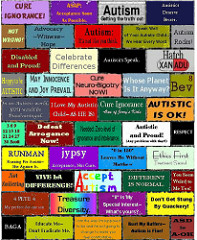They’re out. Or, Out. We have the exquisite “Privilege of Being Clouted By Cabbage” and are navigating the hazards of the supermarket. When things are done the way they’re supposed to be, going to pick up a few groceries is just as boring, or as Dave discovered, lonely, for disabled people as much as it is for everyone else. But sometimes it isn’t, such as when Wheelchair Dancer finds herself navigating the hazards of anonymous donors that leave awkward brochures under her windshield wiper, and then dealing with the even more awkward social fallout with the clerk who’s assisting her.
People with a variety of disabilities come to the store to get groceries, movies, dry cleaning, take-out food, postage stamps, floral arrangements, and because it’s this time of year, garden plants, which is why I am working there. I shouldn’t be surprised, but I am bemused to report that I realised that people with physical ailments are shopping at the store alla time! After all, that is why we have some of those electric carts, in addition to automatic doors, ramped paving, lower check-writing stands, supposedly-accessible bathrooms*, et cetera.
Most of the time I just interact with the public as a “normal” garden center employee, but sometimes we are also interacting with that subtle overlay of disability, which entertains the social scientist part of my brain.
Being the token horticulturalist, I answer questions, help customers plan flower beds and suggest suitable plants for locations. In addition to working the register, watering, deadheading and “facing” the stock (moving pots towards the fronts of the benches to fill in holes left by customers), I work with the others to come up with æsthetically-pleasing displays of the plants. (Although there is no way of hiding the fact that the corporate HQ plagued us with a plethora of Pelargonium, a visual red tide of geraniums.)
I’ve seen plenty of plant displays at a variety of other stores, and have found their long lines of benches to be annoying. It’s not just that endless tracts of pink & purple Petunias, orange & yellow Marigolds, and red Geraniums are mind-numbingly dull to the point of dampening any sort of inspiration for coming up with container or bedding combinations. It’s that the long lines of “benches” block traffic flow. You feel like you’re trudging up and down the maze of a ticket queue, unable to grab some pots of more-interesting Corkscrew Rush or Calibrachoa tha are hidden over there two aisles over. It’s hard to break out of the march to exit stage left to the register (till), or even quit to go over to the entrance into the store. The long lines of benches are especially boring for children, who have little more than a view of the edges of the benches and the pots, with little respite in sight. (I’ve taken to offering children cups of the cold water from our water cooler barrel, as hot, thirsty children are cranky children.)
Worst, when at these other stores run out of available bench space, a lot of the pallets of potted plants just end up dropped by the pallet jack where-ever there’s room on the ground. This means that the aisles are not really planned, so sometimes there are narrow dead-ends, or aisles blocked by broken bags of mulch, or the plants are simply hard to reach because they are way down on the ground or are way deep in the center of the pallet. They are not accessible.
For a few days, we too of a dozen pallets lined up at the edge of our lot, albeit with sufficient aisle space. It really “made my brain hurt”, because the plants had been shipped all higgedy-piggedy, with shrubs, grasses, annuals and perennials all mixed together. There were Daylilies in four different places around our lot! The flats of shade-loving Wax Begonias and Impatiens and sun-loving Verbena and Vinca were all jumbled by species and color! (And OMG, still more Geraniums. And Creeping Phlox, which only looks nice when it’s blooming, and now we have enough to landscape a highway interchange.)
But thankfully, I’m not the only one who has a strong interest in making the endless flats of plants look more interesting, and be more accessible. We’ve been stacking pallets or propping them up on cinderblocks to put the plants into easier view and reach. (Plus, they’re also easier for us to clean and water — ergonomics, w00t!) We’ve been making sure that the aisles are frequently broken up into side-paths, and we try to keep the aisles 3-4 feet wide so carts, strollers and wheelchairs can get through. It seems to be working well; every day we get compliments about how good the plants look.
But what makes this place pleasant to work for is the concern for helping our customers. Sure, it’s store policy to be helpful (doesn’t every business flog that slogan?), but we are glad to break from running the register or watering to carry things out to the car, or load up bags of mulch and rock, or show you where the Verbena is, or explain the differences between the four varieties of white Petunias. When someone has their hands full, we grab some empty flats, and pull carts (buggies, trolleys) over to make things easier.
It’s this “serve everyone” approach that makes helping people with various disabilities so much easier. One of the other clerks knows American Sign Language, so Deaf customers are sure to look for her (my ASL is rather limited). When the gentleman in the power chair thanked a coworker for carrying stuff out to his van, I was tickled to overhear him say, “No problem! We do that for everyone.” Because we do.
Sometimes the “disabled community” moments are colored in large brush strokes. An older man in a wheelchair came by in search of some herb seeds, accompanied by two women who were of the “care-taker” rather than “personal assistant” mentality. Although neither said anything obviously untoward, there was still a patronizing aura, that his desire to go shopping was being honored but that they were still “humoring” him. It made me uncomfortable, and I kept trying to scan the interactions in the triad to figure out what was going on.
But the women were intent on asking me questions of their own, even as they were simultaneously going through the motions of helping him. “Here’s someone who can help you. He’s looking for some seeds. Tell her what you’re looking for. Do you have any seeds? Do you remember what it was he wanted? Ooh, don’t you just love those pink flowers? Isn’t that what you got on your desk?”
“Well I dunno, but it’s not flowering any more. Was you looking for parsley? He was wanting to grow some stuff from seed. You sure gots a lot of plants out here.”
Trying to track all this verbiage flying by was making me dizzy, and I just wanted to focus on finding out what the man came to get. The customer himself was having some expressive difficulties. (Who wouldn’t have, being around those two all day!) I knelt down on a knee so I could speak with him face to face. I had to. I had to disengage myself from the chatty care-takers who were now trying to ask me random questions unrelated to the needs of my primary customer. I had to be able to focus on what he was asking for, which meant watching him speak. And I had to honor him personally as the customer, not as some second-class accessory.
My knees cracked noisily, and I knelt down on one knee, and we conversed, just the garden center clerk and the customer who wanted parsley seeds, and who considered and then decided against the Doubled-Curled or Flat Italian Parsley seedlings.
After that moment, I stood back up and we were sucked back into the vortex of the chatty care-givers, who asked me some confused questions about houseplants, and then led/followed him over to the main store entrance. I hoped he would be getting the things that he wanted this evening.
Sometimes the community moments come by quietly. I was checking out a couple flats of annuals and several perennials for a woman, cleaning off some old leaves and blossoms and chatting as the register processed her credit card in its own slow time.
“This is going to take me several days to get it all planted,” she offered.
“Well, that’s always a good thing to do anyway,” I offered, affirming her wisdom. “It’s those marathon gardening sessions that break our backs.” The register finally finished hiccoughing through the electronic transmission and spat out her receipt. I picked up her potted rose bush, rested it on a hip, and then deftly tipped up the flat of annuals to balance them on my other hand. (It only sounds tricky; in reality the flats are just boxy grates, and I can curl my fingers into them.) “Here, I’ll carry these out for you,” I said, leaving her to handle her purse and a couple quart pots of perennials, then added, “I can’t garden for ten hours solid since I got arthritis.”
“Thanks. I have RA and can only do so much at a time.”
“Ah, yeah,” I commiserated. “You have to make dinners ahead, because the next day you’re too exhausted from gardening.” She nodded, already tired from just the idea of the ordeal ahead. “It’s fun, but you just run out of ‘spoons’!” And then I loaded things into her car and we swapped the mutual thanks. My attention turned to the gardening work of my own, left uncompleted or never even started. Oh, and errands. Here I was at the market nearly every day, but I kept forgetting to get my arthritis medicationn refilled!
“Hey Andrea,” piped up one of my coworkers, “it’s nearly time for you to go on break.” This clerk is a good guy; he’ll remind me when something is coming up, he’ll remind me when it’s time to start, and even after I’ve forgotten it. He asks me if I remembered to clock in, and reminds me (several times) to copy down the next week’s schedule before leaving. It sure is wonderful to have garden center clerks who are so helpful, especially when you when you’re having seriously distracted & forgetful AD/HD days!
* I’ve never navigated the women’s restroom in a wheelchair, but there are still the stupid doors to wrangle …









You must be logged in to post a comment.